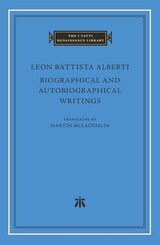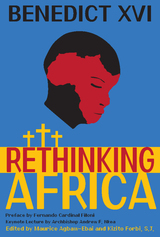
A fresh English translation of five Alberti works that illuminate new aspects of the literary aims and development of the first “Renaissance man.”
Leon Battista Alberti (1404–1472) was one of the most famous figures of the Italian Renaissance. His extraordinary range of abilities as a writer, architect, art theorist, and even athlete earned him the controversial title of the first “Renaissance man.”
The works collected in Biographical and Autobiographical Writings reflect Alberti’s lived experiences and his interests in the genre. This volume includes On the Advantages and Disadvantages of Literature, which partly reflects his experiences as a student in Bologna; The Life of St. Potitus, the biography of a Christian martyr, which also contains autobiographical projections and was to have been the first in a series of lives of saints; My Dog, a mock funeral oration for his dead dog; My Life, one of the first autobiographies of the early modern period and the main source for Jacob Burckhardt’s portrait of Alberti; and a comic encomium, The Fly. In particular, the last three works—My Dog, My Life, and The Fly—constitute a kind of trilogy, as the humanist finds one of his main themes, the portrait of the ideal life, with a strong emphasis on humor.
This edition presents the first collected English translations of these works alongside an authoritative Latin text.

An innovative collection of comedic stories by the original “Renaissance man.”
Leon Battista Alberti (1404–1472) was among the most famous figures of the Italian Renaissance. His extraordinary range of abilities as a writer, architect, art theorist, and scientist made him the original model for the many-sided “Renaissance man.”
A collection of stories meant to be read while dining and drinking, the Dinner Pieces, or Intercenales, are one of Alberti’s most innovative and experimental works, mixing literary genres and styles of prose composition adapted from both Greek and Latin models. They cover a wide range of topics, from moral philosophy, politics, and religion to the arts, money-making, love and friendship, and the study of the humanities. The Dinner Pieces offer satiric commentary on the cultural illusions and moral myths of Alberti’s day. They cut through the absurdity of human existence with the blade of wit and laughter and constitute an important monument in the history of comic writing.
This English translation by David Marsh is based on the authoritative Latin text of Roberto Cardini, accompanied by ample notes.

An innovative collection of comedic stories by the original “Renaissance man.”
Leon Battista Alberti (1404–1472) was among the most famous figures of the Italian Renaissance. His extraordinary range of abilities as a writer, architect, art theorist, and scientist made him the original model for the many-sided “Renaissance man.”
A collection of stories meant to be read while dining and drinking, the Dinner Pieces, or Intercenales, are one of Alberti’s most innovative and experimental works, mixing literary genres and styles of prose composition adapted from both Greek and Latin models. They cover a wide range of topics, from moral philosophy, politics, and religion to the arts, money-making, love and friendship, and the study of the humanities. The Dinner Pieces offer satiric commentary on the cultural illusions and moral myths of Alberti’s day. They cut through the absurdity of human existence with the blade of wit and laughter and constitute an important monument in the history of comic writing.
This English translation by David Marsh is based on the authoritative Latin text of Roberto Cardini, accompanied by ample notes.

READERS
Browse our collection.
PUBLISHERS
See BiblioVault's publisher services.
STUDENT SERVICES
Files for college accessibility offices.
UChicago Accessibility Resources
home | accessibility | search | about | contact us
BiblioVault ® 2001 - 2024
The University of Chicago Press









